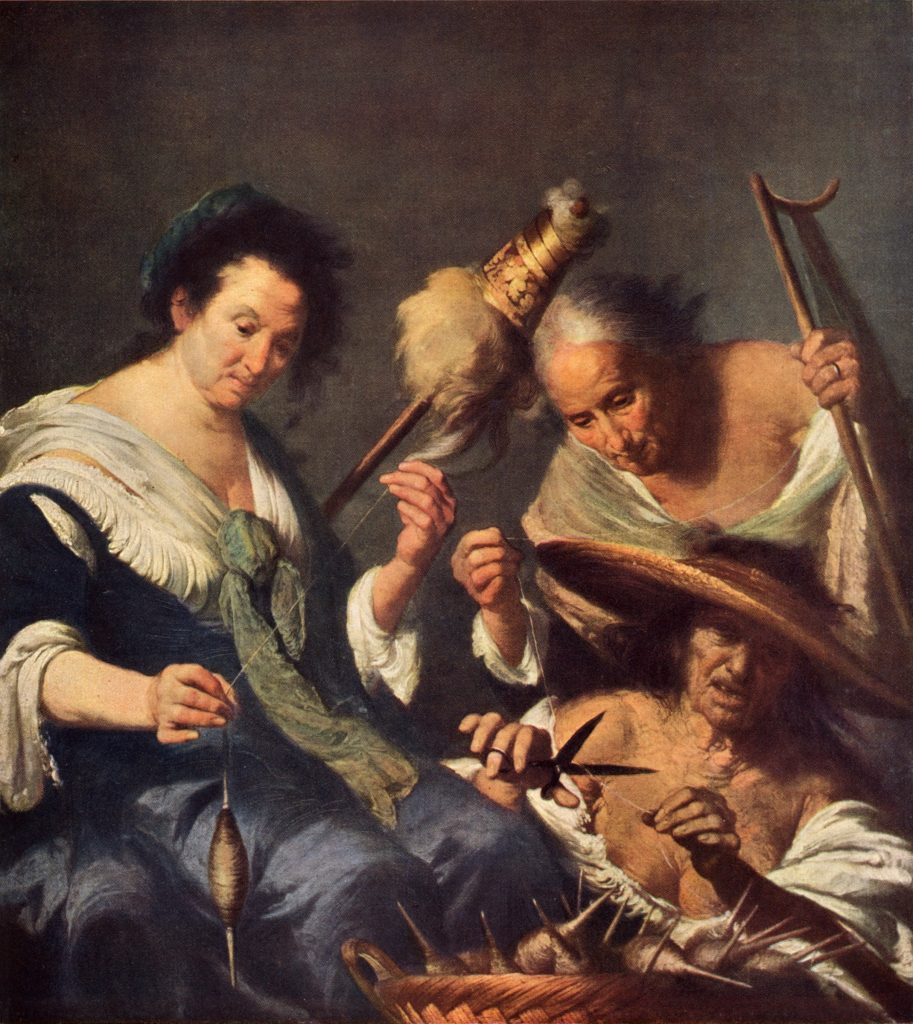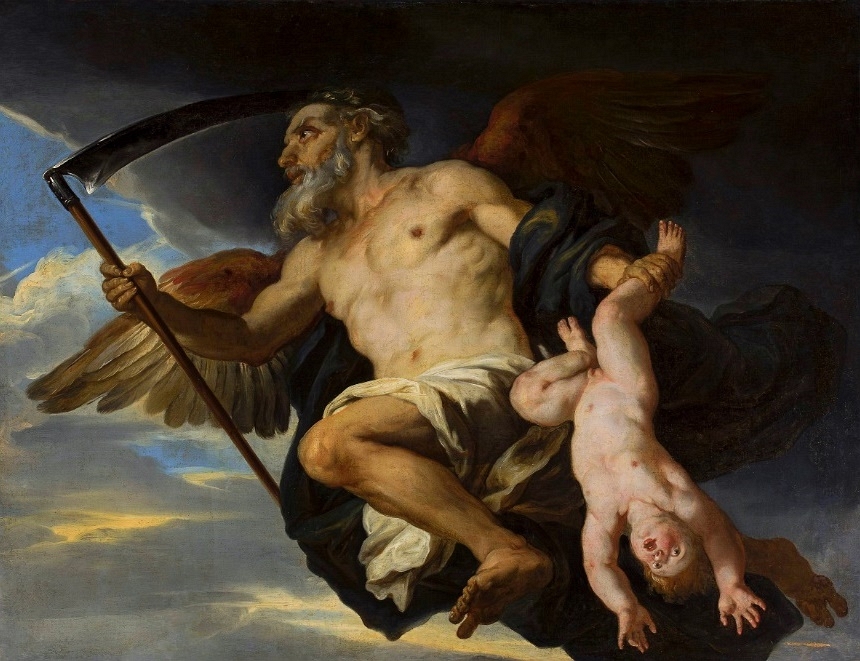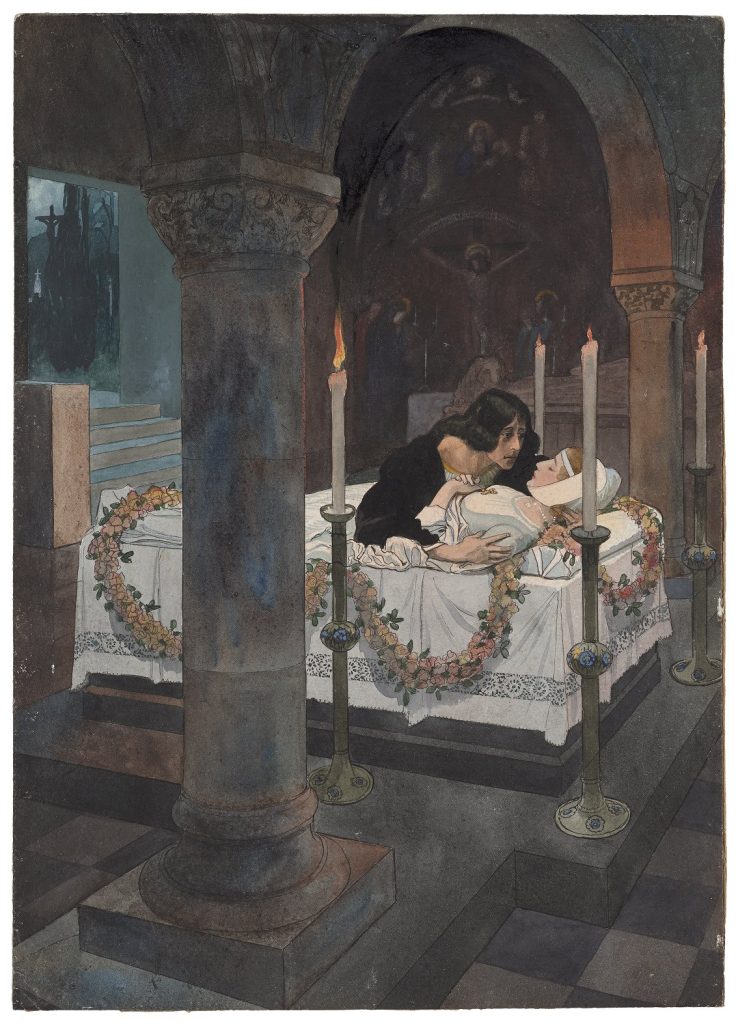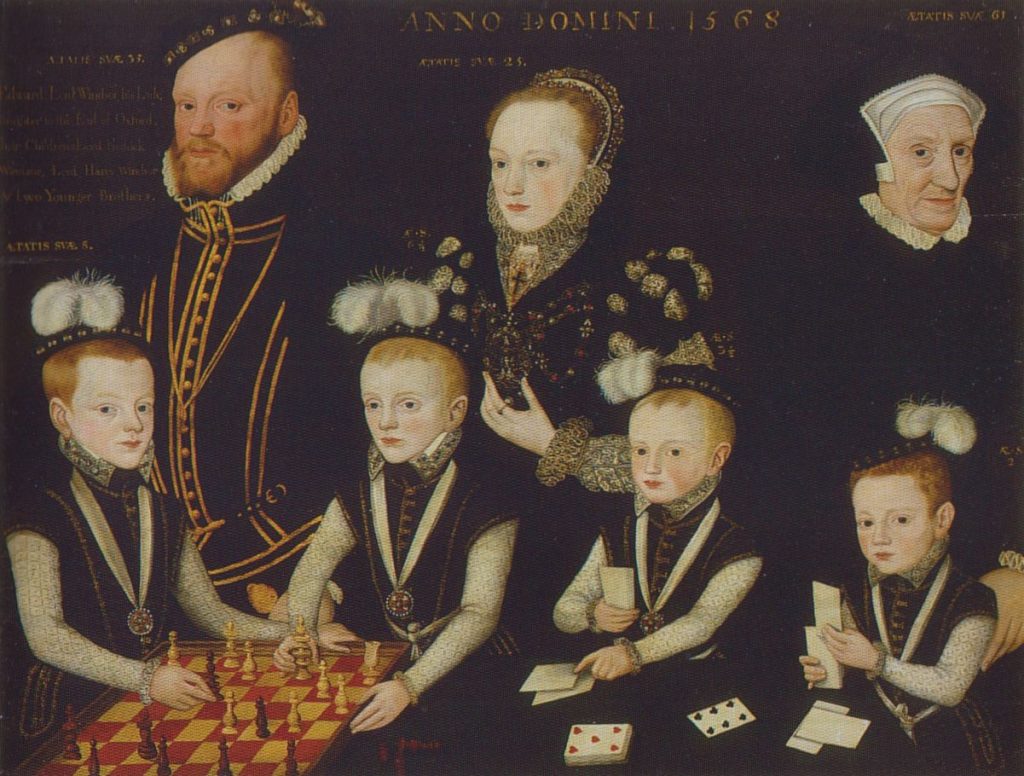8 Attitudes and Issues
Romantic Love
Contrary to popular belief, in Romeo and Juliet there is no easy acceptance of romantic love as an ideal. Initially, there is a strong intellectual questioning of the concept. This questioning is embodied in the action, in the conflicting views of different characters, and in their language.
True love enters the play only at Romeo’s and Juliet’s first meeting at the end of Act 1, and the lovers have much to endure before their love is tragically perfected in their deaths. Throughout the play, Romeo’s and Juliet’s love, which is complete because it is bodily, emotional and spiritual, challenges other concepts of love that are either intentionally embraced (for example by Mercutio) or much more often, assumed, by characters who have not arrived at a definition for themselves. Broadly based on social norms, these characters’ concepts contrast with the individualist ideal that Romeo’s and Juliet’s mutual love represents. Their intense love involves the whole of themselves, body and spirit. Bordering on immortality, it lives on the extreme edge of human possibility.
When Shakespeare wrote Romeo and Juliet he almost certainly believed in the fulfilment, transitory or otherwise, that this ideal promises. Romeo’s and Juliet’s sonnet at their first meeting recalls Shakespeare’s praise in Sonnet 116 of love so constant that it triumphs over Fate and Time:
Let me not to the marriage of true minds
Admit impediments. Love is not love
Which alters when it alteration finds,
Or bends with the remover to remove.
O no! it is an ever-fixed mark
That looks on tempests and is never shaken;
It is the star to every wand’ring bark,
Whose worth’s unknown, although his height be taken.
Love’s not Time’s fool, though rosy lips and cheeks
Within his bending sickle’s compass come;
Love alters not with his brief hours and weeks,
But bears it out even to the edge of doom.
If this be error and upon me prov’d,
I never writ, nor no man ever lov’d
The Causes of Tragedy
Aristotle’s Poetics is a key to understanding dramatic modes stemming from Europe. If you don’t have time to read this for yourself, I recommend this summary of the causes of tragedy provided by Cliff’s Notes, available for instant free download here.
The following quote sums up Aristotle’s priorities:
It is true that the hero frequently takes a step that initiates the events of the tragedy and, owing to his own ignorance or poor judgment, acts in such a way as to bring about his own downfall. In a more sophisticated philosophical sense though, the hero’s fate, despite its immediate cause in his finite act, comes about because of the nature of the cosmic moral order and the role played by chance or destiny in human affairs.
In other words, the hero (or heroine) often makes a mistake that initiates the tragedy, but the overriding cause of tragedy is the nature of the universe and the operations of chance, i.e., bad luck. Human life is full of danger, death, and tragedy. A fall of the dice brings about happiness or despair. Reminders of the power of Fate, Fortune or Chance are scattered throughout Romeo and Juliet.
In Act 1 Romeo fears that the party crashers’ arrival at the Capulet ball will, in the cosmic scheme of things, come too early:
For my mind misgives
Some consequence yet hanging in the stars
Shall bitterly begin his fearful date
With this night’s revels…. (scene 4, lines 113-116)
Similar brief, powerful utterances by Romeo mark key moments in the tragedy as it evolves:
a) The death of Mercutio: ‘This day’s black fate on moe days doth depend/This but begins the woe others must end’ (Act 3, scene 1, lines 124-125)
b) The slaying of Tybalt: ‘O, I am fortune’s fool!’ (Act 3, scene 1, line 142)
c) The (false) news of Juliet’s death: ‘Is it e’en so? Then I defy you, stars’ (Act 5, scene 1, line 25).
Fate’s part in Romeo and Juliet is indeed excruciating. It is pure chance that Friar Lawrence’s warning that Juliet’s death is a pretence fails to reach Romeo. Fortune-driven tragedy climaxes when Romeo swallows the poison draft a second before Juliet’s awakening. In some productions, Juliet moves, and Romeo realises in the last moment of his life that she is still alive. In other productions, the lovers look with recognition into each other’s eyes in the second before Romeo loses consciousness. Even without these extreme adaptations, the textual evidence supports the conclusion that Romeo and Juliet is first and foremost a tragedy of Fate. Any moral flaws in the protagonists or their families or others are secondary to this.

Characters’ moral failings, some transitory and others ingrained, nevertheless contribute in varying degrees to the unfolding tragedy. Since both lovers mature over the course of the play it follows that they are not perfect to begin with. Despite her extreme youth, Juliet nevertheless has a strong claim to be regarded as the Shakespearean character who is closest to perfection. A thoughtful youth from the beginning, Romeo likewise matures over the course of the play.
Explore the Text
A. Romeo
Answer the following questions, based on your own reading of Romeo and Juliet:
- When does Romeo display an immature understanding of love?
- When does he respond to a challenge with mature self-control?
- When does he fight bravely on behalf of a dead friend?
- When does he respond to bad luck like a spoiled child?
- When does he kill someone in response to a challenge?
- When does he prove himself to be a brave and faithful lover?
B. Moral responsibility
‘Deliberate faults, moral and emotional blindness and irrational decisions by characters other than the lovers contribute far more than Fate to the tragic unfolding of Romeo and Juliet.’
How far do you agree?
How much responsibility does each of the following characters bear for the play’s tragic outcomes?
- Capulet
- Lady Capulet
- Montague
- Lady Montague
- Tybalt
- Mercutio
- The Nurse
- Friar Laurence
- Prince Escalus.
Youth and Age
We all need to grow up. Some do. Others just grow older.
Romeo and Juliet celebrates the inventiveness, strength and joy of young people, and the spontaneity and generosity of their loves and friendships. Until Mercutio’s death, astonishing and indeed unbelievable as that moment is, the play invites audiences to rejoice in young people’s jokes, wit, athleticism, risk-taking and creativity. On the other hand, Romeo and Juliet also invites us to consider the difference between young people’s hasty and inconsiderate actions.
Explore the Text
Discuss examples of what you consider to be over-hasty actions in Romeo and Juliet.
How justified, morally and by circumstance, do you consider each action to be?
The aged by contrast are not only physically depleted (as in Capulet’s inept sword-play in scene 1) but also rigidly conventional. Unable to understand their son, the Montagues induce his friend Benvolio to spy on him in what is surely a negative dramatisation of the ‘generation gap’. Fixated as they are on money and status, the Capulets are unloving, obtuse and finally hasty and tyrannical in their treatment of Juliet. The Nurse’s intelligence is always questionable, but her final advice to Juliet—to marry Paris—brings her courage and her loyalty also into question.
Friar Laurence is the only parental figure in Romeo and Juliet with a claim to wisdom. His intentions are good, but neither his proverbs nor his plots prevent the tragic outcome, and he deserts Juliet in her moment of crisis, when she awakens beside Romeo’s dead body.
In contrast with their elders, Romeo and Juliet grow up at lightning speed. Life forces choices upon them, as it does on all of us, but faster: Romeo chooses to fight Tybalt; Juliet chooses to drink the Friar’s draft. With circumstances and the adult world against them, they discover, both in each other and in themselves, reserves of physical and moral courage hitherto unknown.
Time Passing and Bad Timing

The many precise references to hours and days in Romeo and Juliet, unique in Shakespeare’s plays, point to the passing of time as a major theme. Weis’s introduction discusses the time references at length (24-33). Our summary under “Story” plots the compressed time scheme. Almost everything happens fast; most of the action is vibrant and energetic; the comedy is both physical and verbal. The characters’ many impulsive actions and the speed of events dramatise the brevity of youth and beauty and the lightning speed with which these gifts leave us.
The many references to time point also to bad timing as a major theme. Fate or bad luck— “some consequence yet hanging in the stars” (Act 1, scene 3, line 114)—prevents Friar Lawrence’s warning that Juliet’s death is a pretence from reaching Romeo. This delay is one in the series of bad timings in Act 5 that make the lovers’ deaths inevitable. In the last Act, characters rush about in fear, ignorance and confusion. Except at Romeo’s and Juliet’s actual deaths, when they are the only speakers, and in the long closing speeches by Friar Lawrence and others that summarise the tragedy’s moral teachings, decorum and reason are in short supply.
The most obvious external comparison of the play’s Time theme is with Shakespeare’s sonnets, some of which seek to recruit a) the hoped-for offspring of a loved person and b) the commemoration of his beauty as defence against Time:
Not marble, nor the gilded monuments
Of princes, shall outlive this powerful rhyme;
But you shall shine more bright in these contents
Than unswept stone, besmeared with sluttish time. (Sonnet 55, lines 1-4)
These lines with their contrasting images suggest that though Time passes inexorably, it can be shaped by the visual imagination and by words. The same idea is expressed in Sonnet 63, ‘Against my love shall be as I am now, / With Time’s injurious hand crushed and o’erworn…’ (lines 1-2). Like the masterly poetry of Romeo and Juliet, these and others of Shakespeare’s sonnets shape erotic love as an escape from Time’s destructiveness. As in the play, however, the escape lasts only as long as the words creating it occupy the reader’s mind.
Aging and Death
Yet Romeo and Juliet arguably makes the longed-for escape from Time eternal. Their love for each other, perfect at their deaths, will never vary, never lessen. By dying they have freed themselves from the burdens of aging, embodied in Romeo’s description of the Apothecary, who is as much an icon of Age as he is of Need:
I do remember an apothecary,
And hereabouts ’a dwells, which late I noted,
In tattered weeds, with overwhelming brows,
Culling of simples. Meagre were his looks,
Sharp misery had worn him to the bones,
And in his needy shop a tortoise hung,
An alligator stuffed and other skins
Of ill-shaped fishes; and about his shelves
A beggarly account of empty boxes… (Act 5, scene 1, lines 40-48)
Other lines, such as Romeo’s at his first sight of Juliet in the tomb, confirm that death enshrines their love and beauty at its moment of perfection:
A grave—O no, a lantern slaughtered youth,
For here lies Juliet, and her beauty makes
This vault a feasting presence full of light. (Act 5, scene 3, lines 84-86)
Here, as elsewhere in Romeo and Juliet, Shakespeare’s poetry tumbles over into spiritual hope: age is an abomination, but death may after all prove to be the doorway to a fully realised love.

Human and Divine Justice
Romeo and Juliet is scathing about human justice. Prince Escalus’s efforts do not bring about peace between the Capulets and the Montagues, and his banishment of Romeo is unjust (see the discussion under Story).
Concerning divine justice, some of the suffering inflicted in Romeo and Juliet as punishment for a failure to forgive and make peace seems appropriate. Examples are the violent death of violent Tybalt; Prince Escalus’ loss of his kinsmen; and the Capulets’ and Montagues’ loss of their children. Yet much more of the suffering—the deaths of Mercutio, Paris and the lovers—seems arbitrary and the work of a malignant Fate. Shakespeare’s language leaves room for a continuing hope in divine justice, but like all great tragedies, Romeo and Juliet brings us face-to-face with the uncertainty that is inherent in human outcomes.
Family Loyalty Versus Loyalty to Feeling
The above clash is an important theme in Romeo and Juliet. Most cultures both ancient and modern have seen loyalty to family as primary, but the Elizabethans were fanatical on the subject. In a society that rarely rebelled openly against hierarchy-nobility and gentry served the monarch, farmers and shepherds served the gentry, apprentices and workers in the towns served the merchants—the subservience of wives and children to the father (the pater familias) was rarely questioned.
The family portrait below captures what seems usually to have been the rigid home life of Elizabethan gentry:

In Romeo and Juliet, Lady Capulet briefly ridicules her old husband’s unfitness for battle, but no one except Juliet—and then only briefly—openly challenges his right to govern the household. Since breastfeeding was regarded as beneath the dignity of upper-class women, household hierarchy—the rule of both parents—is likewise implicit in the Nurse’s suckling of Juliet. The virtual imprisonment of the unmarried Juliet in the house—she leaves it, chaperoned by the Nurse, only to attend church—was standard for the times (see Shakespeare’s London 155). Moreover, once Juliet marries, she adheres, probably with the approval of Shakespeare’s first audiences, to the hierarchy of husband and wife:
NURSE: Will you speak well of him that killed your cousin?
JULIET: Shall I speak ill of him that is my husband?
Ah, poor my lord, what tongue shall smooth thy name
When I thy three-hours wife have mangled it? (Act 3, scene 2, lines 105-109)
Thus, while Romeo and Juliet adheres in some respects to Elizabethan family, gender and social hierarchies, sympathy favours the young lovers in their non-compliance with expectations that are shown to be flawed. Like the Romantics in a much later era, Romeo and Juliet asserts the moral primacy of loyalty to a person’s own feelings.
Like Hamlet, Othello, King Lear and Macbeth, Romeo and Juliet take us to the border between life and death. Shakespeare invites us to contemplate the view in both directions.

